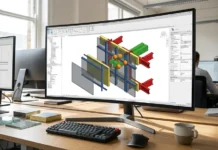Construction projects are intricate endeavors that demand the consistent and prompt analysis of vast datasets. This challenge is pervasive across various projects, and the existing construction data management model needs to be updated. Data collection and sharing is a cumbersome process, and the sheer volume of data makes efficient utilization daunting. This is where artificial intelligence (AI) helps, heralding a future where AI simplifies data collection, management, and utilization, revolutionizing the construction industry by eliminating the need for laborious manual data sorting.
Here is a breakdown of how AI is set to reshape construction data management as we know it:
Enhanced Scheduling and Coordination of Logistics: Delays are a common issue in construction, with as much as 70 percent of projects experiencing setbacks, as revealed by a 2021 KPMG survey. AI technology removes the guesswork from coordination, bolstering construction data management. This enables better planning and project control, reducing conflicts and surprises that can lead to delays. AI also identifies opportunities to streamline logistics, including equipment rentals and purchases, and predicts and mitigates labor, equipment, and availability risks. AI complements human roles, facilitating more accurate project outcomes.
Revolutionizing Problem Solving: AI excels at interpreting vast data and using it to make informed decisions. It analyzes weather conditions, costs, safety records, and material usage to address complex construction challenges. AI understands these challenges, predicts and prevents errors through machine learning algorithms, optimizes resource allocation, and improves project scheduling accuracy. AI identifies patterns and provides actionable insights, accelerating problem resolution and reducing the risk of costly, ineffective solutions.
Proactive Recommendations: AI learns from human input and training, going beyond problem-solving to help companies address impending issues. It collaborates with construction firms to navigate through time-consuming data, using machine learning and historical analysis to forecast potential project delays or cost overruns, enabling preemptive actions. It also optimizes resource allocation based on past project patterns, ensuring projects start correctly.
Reducing Waste: The construction industry is notorious for wasting time, equipment, money, and materials. AI can assist in addressing these wasteful practices by identifying patterns and suggesting innovative solutions. It serves as a quality control tool, accurately accounting for excessive materials, equipment, and labor usage, providing cost-effective and resource-efficient solutions contributing to a more sustainable industry.
Eliminating Manual Inefficiencies: Construction data management can be overwhelming, with manual tasks consuming significant time. AI will eventually automate and streamline monotonous, time-consuming tasks like scheduling, logistics, surveillance, and material procurement, reducing the likelihood of human errors and improving project timelines.
Notifying Stakeholders of Changes: Stakeholder communication is vital in construction projects, and AI simplifies this by automatically sending notifications regarding updates or changes. AI processes various data points and swiftly summarizes and conveys them into messages, ensuring stakeholders stay informed and valuable input is received promptly.
































